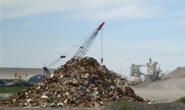Prices

February 4, 2014
Scrap Market in "New Dynamic" as Exports Wane
Written by John Packard
According to scrap experts, most of the domestic mills canceled their January orders at the close of business this past Friday when shipment of the past due scrap had not already been made. Cancellations are standard operating procedure by the domestic mills when they believe scrap prices will drop once the new month’s negotiations are complete.
However, not everyone is a believer that all of the steel mills canceled their orders as there have been transportation issues in moving January’s orders and some mills may wish to keep their orders intact – even at higher prices – in order to ensure that they will have enough feed stock for February.
Over the past couple of weeks the domestic mills have been talking the market down by $20 to $30 per gross ton. Weak export sales and an abundance of prime grades of scrap out of the automotive and other industrial sectors were more than offsetting weak flows of obsolete scrap into the yards.
According to Bob Marley of MetalPrices.com, East Coast scrap exporters are offering thousands of tons of shredded scrap to the domestic mills. Busheling prices will most likely end up being $10 to $15 per ton higher than the less desirable shredded scrap (shredded scrap has higher residuals than prime grades such as bundles and busheling).
Many mills allow the markets to ultimately determine their price buy. Those mills will issue TBD (price to be determined) purchase orders to their scrap suppliers so they can continue to get a constant stream of feedstock and allow the market the five to ten days it might take to come to a final price resolution. TBD orders may be acceptable to scrap dealers when prices are rising but, they are less willing to commit to a future “unknown” number when market prices are falling.
The items which appear to be the weakest are in the Midwest due to the cold weather constraining inflows of material into the yards. The weakest items are #1 heavy melt (HMS), 5-foot plate and structural and shredded scrap. East Coast exporters will be able to satisfy some of the Western Pennsylvania or eastern Ohio Valley mills.
The cold weather is also creating some equipment problems as machinery (and people) don’t work as well at temperatures well below zero which is what most of the Upper Midwest such as Chicago have been dealing with for a number of weeks .
Over the weekend we asked a couple of our scrap sources to weigh in and provide their prognostication as to where scrap prices will go compared to the January numbers. We received everything from a minimum of down $20 from one expert with a dealer in the Northeast calling the market down $30 to $40 per gross ton and a another dealer telling us the Midwest numbers may only drop by $10 to $15 per gross ton.
We were told by one dealer that there were some shredded scrap deals done in the Ohio Valley at $415 to $420 per gross ton. This is down $25-$30 per gross ton from early January levels.
Scrap pricing can vary from market to market but we should start to get some better clarification of the various regions as the new workweek progresses.
However, the scrap market has fundamentally been altered if exports are not there to put a bottom on the market. One dealer told us on Saturday, “The situation has really deteriorated in the last few weeks. The lack of export is both a practical and psychological increase in the supply of domestic scrap. Not many people (including me) saw this coming a month or so ago. For now and the foreseeable future we are in a new dynamic that we have not seen in many years.”







